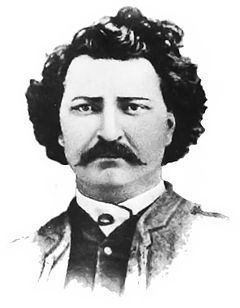Louis Riel
| Louis Riel | |
|---|---|
 |
|
| President of the Provisional Government of Saskatchewan | |
|
In office March 19, 1885 – May 20, 1885 |
|
| Preceded by | office established |
| Succeeded by | office abolished |
| Member of Parliament for Provencher |
|
|
In office 13 October 1873 – 22 January 1874 |
|
| Preceded by | George-Étienne Cartier |
| Succeeded by | Andrew Bannatyne |
| Personal details | |
| Born |
Louis David Riel 22 October 1844 Red River Colony, Rupert's Land, British North America |
| Died | 16 November 1885 (aged 41) Regina, Northwest Territories, Canada |
| Spouse(s) | Marguerite Monet dit Bellehumeur (1881–1885) |
| Children | Jean-Louis, Marie-Angélique |
| Signature |  |
Louis David Riel (English /ˈluːiː riːˈɛl/, French pronunciation: [lwi ʁjɛl]; 22 October 1844 – 16 November 1885) was a Canadian politician, a founder of the province of Manitoba, and a political leader of the Métis people of the Canadian prairies. He led two resistance movements against the Canadian government and its first post-Confederation prime minister, Sir John A. Macdonald. Riel sought to preserve Métis rights and culture as their homelands in the Northwest came progressively under the Canadian sphere of influence. Over the decades, he has been made a folk hero by the Francophones, the Catholic nationalists, the native rights movement, and the New Left student movement. Riel has received more scholarly attention than practically any other figure in Canadian history.
His first resistance was the Red River Rebellion of 1869–1870. The provisional government established by Riel ultimately negotiated the terms under which the modern province of Manitoba entered the Canadian Confederation. Riel ordered the execution of Thomas Scott, and fled to the United States to escape prosecution. Despite this, he is frequently referred to as the "Father of Manitoba". While a fugitive, he was elected three times to the Canadian House of Commons, although he never assumed his seat. During these years, he was frustrated by having to remain in exile despite his growing belief that he was a divinely chosen leader and prophet, a belief which would later resurface and influence his actions. Because of this new religious conviction, Catholic leaders who had supported him before increasingly repudiated him. He married in 1881 while in exile in Montana in the United States; he fathered three children.
...
Wikipedia
